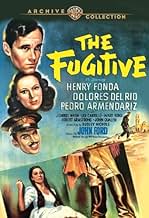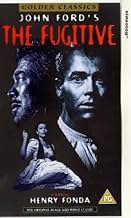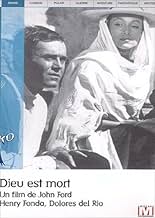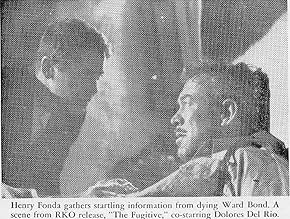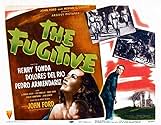CALIFICACIÓN DE IMDb
6.3/10
2.7 k
TU CALIFICACIÓN
En el estado mexicano de Tabasco, el sentimiento anticlerical lleva a un gobierno revolucionario a perseguir a los curas.En el estado mexicano de Tabasco, el sentimiento anticlerical lleva a un gobierno revolucionario a perseguir a los curas.En el estado mexicano de Tabasco, el sentimiento anticlerical lleva a un gobierno revolucionario a perseguir a los curas.
- Dirección
- Guionistas
- Elenco
- Premios
- 1 premio ganado y 2 nominaciones en total
Dolores Del Río
- An Indian Woman
- (as Dolores Del Rio)
Pedro Armendáriz
- A Lieutenant of Police
- (as Pedro Armendariz)
Chris-Pin Martin
- An Organ-Grinder
- (as Cris-Pin Martin)
Miguel Inclán
- A Hostage
- (as Miguel Inclan)
Fernando Fernández
- A Singer
- (as Fernando Fernandez)
Rodolfo Acosta
- Policeman
- (sin créditos)
Mel Ferrer
- Father Serra
- (sin créditos)
Jack Pennick
- Man
- (sin créditos)
José Torvay
- Mexican
- (sin créditos)
- Dirección
- Guionistas
- Todo el elenco y el equipo
- Producción, taquilla y más en IMDbPro
Opiniones destacadas
John Ford's adaptation of Graham Greene's "The Power And The Glory" captures perfectly the potential for the seven deadly sins in all of us. It is an incredibly and understatedly raw and emotional and downright earthy movie. The entire supporting cast is brilliant, and Fonda, of course, is excellent, if not precisely ideal. This is in all senses, a quintessential study in soul-searching.
Hmmm, let's see... we've got a movie about a Catholic priest trying to exercise his ministry in a Latin American country whose government has been taken over by an anticlerical revolutionary party,... he administers the sacraments to the devoutly believing people while trying to stay one step ahead of the law, which has hunted down every other priest in the country,... what do you this movie will be like?
In the hands of the crusty but sentimental John Ford, you might expect this movie to be some kind of hagiography, showing the priest as he performs his pastoral labors with fierce courage as well as with patient devotion, and anticipates his fate with Christian resignation. (This would be particularly apt if Pat O'Brien or Spencer Tracy played the priest.) You might also expect the people he serves will be portrayed as simple God-fearing people with stout hearts and no illusions about the true intentions of their political leaders. The government and its agents will be portrayed as cruel and cynical tyrants, ever ready to beat on the simple folk in the name of the greater good.
Fortunately, this is not the movie that Ford made. The actual movie is a good deal more complicated (and much, much better) than that. This is a balanced, intelligent account of a tragic situation born of centuries of misrule and oppression by tyrannical government working, sad to say, hand in glove with the Church that is supposed to comfort the afflicted and afflict the comfortable. Pedro Amendariz in particular gives a great performance as the revolutionary government official, who, whatever his opinions may be, passionately loves his country, and sincerely wants the best for his beleaguered people. Henry Fonda, as the priest, gives at one point a stunning assessment of his motives for what he does which turns any picture of a heroic shepherd on its ear.
This is one of John Ford's lesser known pictures - an unknown masterpiece.
In the hands of the crusty but sentimental John Ford, you might expect this movie to be some kind of hagiography, showing the priest as he performs his pastoral labors with fierce courage as well as with patient devotion, and anticipates his fate with Christian resignation. (This would be particularly apt if Pat O'Brien or Spencer Tracy played the priest.) You might also expect the people he serves will be portrayed as simple God-fearing people with stout hearts and no illusions about the true intentions of their political leaders. The government and its agents will be portrayed as cruel and cynical tyrants, ever ready to beat on the simple folk in the name of the greater good.
Fortunately, this is not the movie that Ford made. The actual movie is a good deal more complicated (and much, much better) than that. This is a balanced, intelligent account of a tragic situation born of centuries of misrule and oppression by tyrannical government working, sad to say, hand in glove with the Church that is supposed to comfort the afflicted and afflict the comfortable. Pedro Amendariz in particular gives a great performance as the revolutionary government official, who, whatever his opinions may be, passionately loves his country, and sincerely wants the best for his beleaguered people. Henry Fonda, as the priest, gives at one point a stunning assessment of his motives for what he does which turns any picture of a heroic shepherd on its ear.
This is one of John Ford's lesser known pictures - an unknown masterpiece.
Graham Greene is one of the literary greats, and while the book 'The Power and the Glory' that 1947's 'The Fugitive' is based on is not one of my favourites of his and one can totally see why it was controversial at the time it is an interesting read. John Ford was a truly fine director, one of the best at that time, known for some of the finest Westerns around and he excelled too in non-Westerns (i.e. 'The Quiet Man'). The cast is an interesting one, Henry Fonda being the best known.
'The Fugitive' adaptation-wise is a loose one, and the censorship the film had to endure dilutes the impact somewhat. Two of the biggest differences being Fonda's character being no longer being an alcoholic and the central relationship not being sexual, which if included would have the film quite bold. If included though, it would have made it as divisive as the book. On its own terms, 'The Fugitive' didn't wow me and the potential was there for it to have been a much better film. But it was still not bad at all, actually thought that it was quite good, and there are a fair share of note-worthy good elements.
Coming off best of the many good things is Gabriel Figueroa's outdoor photography. Which is really quite miraculous, so many of the shots leave one in wonder in their beauty and varied technical skill. Oh and the outdoor locations are just stunning. The haunting score doesn't feel too constant or in your face, having the right mood throughout while not over-emphasising too much. Ford does show frequently how great he was as a director, at its best his direction here in 'The Fugitive' is quite masterly.
Some very thoughtful and powerful moments in the script and enough of the story compels and moves. The performances are very good, with a smouldering Dolores Del Rio (though she does have moments where she overacts) and a remarkably nuanced Fonda in a complex role being generally strong. The best performance comes from a both menacing and tortured Pedro Armendariz, who is riveting whenever he appears.
On the other hand, too much of the writing is very melodramatic to an over-cooked degree, as is Del Rio at times. Some of the pace is a bit draggy.
Do agree with those that say that the religious element of the story is very heavy-handed and at times vague. It is focused on too much and it is delivered with little subtlety, the messaging was done in a way that made me feel beaten around the head.
All in all, a lot of note-worthy things but flawed. One of those "appreciated what it tried to do" sort of films while not properly loving it, the divisiveness in opinions is understandable. 6.5/10
'The Fugitive' adaptation-wise is a loose one, and the censorship the film had to endure dilutes the impact somewhat. Two of the biggest differences being Fonda's character being no longer being an alcoholic and the central relationship not being sexual, which if included would have the film quite bold. If included though, it would have made it as divisive as the book. On its own terms, 'The Fugitive' didn't wow me and the potential was there for it to have been a much better film. But it was still not bad at all, actually thought that it was quite good, and there are a fair share of note-worthy good elements.
Coming off best of the many good things is Gabriel Figueroa's outdoor photography. Which is really quite miraculous, so many of the shots leave one in wonder in their beauty and varied technical skill. Oh and the outdoor locations are just stunning. The haunting score doesn't feel too constant or in your face, having the right mood throughout while not over-emphasising too much. Ford does show frequently how great he was as a director, at its best his direction here in 'The Fugitive' is quite masterly.
Some very thoughtful and powerful moments in the script and enough of the story compels and moves. The performances are very good, with a smouldering Dolores Del Rio (though she does have moments where she overacts) and a remarkably nuanced Fonda in a complex role being generally strong. The best performance comes from a both menacing and tortured Pedro Armendariz, who is riveting whenever he appears.
On the other hand, too much of the writing is very melodramatic to an over-cooked degree, as is Del Rio at times. Some of the pace is a bit draggy.
Do agree with those that say that the religious element of the story is very heavy-handed and at times vague. It is focused on too much and it is delivered with little subtlety, the messaging was done in a way that made me feel beaten around the head.
All in all, a lot of note-worthy things but flawed. One of those "appreciated what it tried to do" sort of films while not properly loving it, the divisiveness in opinions is understandable. 6.5/10
When Herbert J. Yates of Republic Pictures made a deal with John Ford to produce The Quiet Man he first made Ford agree to do one of his cavalry epics with John Wayne because he wanted a surefire moneymaker before taking a chance on The Quiet Man. The cavalry picture was Rio Grande.
He must have been talking to the folks at RKO who lost their collective shirts when the public stayed away in droves from The Fugitive. It got great critical acclaim and no box office at all.
My guess is that The Fugitive was sold all wrong or was made a year or two too early. If it had been sold as an anti-Communist as opposed to a pro-Catholic film it might have done better in those beginning years of The Cold War.
The Fugitive is based on a Graham Greene novel The Power and the Glory and it is about a priest in an unnamed South American country who is a fugitive because of his calling. An anti-clerical government has taken control of the country and they are doing their best to drive the Catholic religion out of the country.
Henry Fonda turns in a good sincere performance as the cleric, but he's about as convincingly Latino as Toshiro Mifune. The other members of the cast are well suited for their roles.
The best performance in the film is from that chameleon like actor J. Carrol Naish who could play any kind of nationality on the planet. He's the informer who rats out Henry Fonda to the police. Very similar to what Akim Tamiroff did to Gary Cooper in For Whom The Bells Toll and Naish's own performance in another Gary Cooper film, Beau Geste.
This was the first of three films Pedro Armendariz did with John Ford in an effort to broaden his appeal beyond Mexican cinema. Dolores Del Rio as his estranged wife was already familiar to American audiences from the silent screen.
The original novel by Greene had the priest as somewhat less than true to all his vows. He's a drinker and a womanizer. Del Rio's character is also quite tawdry. And this from Greene who was a well known Catholic lay person. But this Hollywood in the firm grip of The Code so a lot of what Greene wrote had to be softened by Ford for the screen. It lessened the impact of the film.
And with the whitewashing of Fonda's character came some rather heavy handed symbolism of Fonda as a Christlike figure.
Still The Fugitive might be worth a look for Ford, Greene, and Fonda fans.
He must have been talking to the folks at RKO who lost their collective shirts when the public stayed away in droves from The Fugitive. It got great critical acclaim and no box office at all.
My guess is that The Fugitive was sold all wrong or was made a year or two too early. If it had been sold as an anti-Communist as opposed to a pro-Catholic film it might have done better in those beginning years of The Cold War.
The Fugitive is based on a Graham Greene novel The Power and the Glory and it is about a priest in an unnamed South American country who is a fugitive because of his calling. An anti-clerical government has taken control of the country and they are doing their best to drive the Catholic religion out of the country.
Henry Fonda turns in a good sincere performance as the cleric, but he's about as convincingly Latino as Toshiro Mifune. The other members of the cast are well suited for their roles.
The best performance in the film is from that chameleon like actor J. Carrol Naish who could play any kind of nationality on the planet. He's the informer who rats out Henry Fonda to the police. Very similar to what Akim Tamiroff did to Gary Cooper in For Whom The Bells Toll and Naish's own performance in another Gary Cooper film, Beau Geste.
This was the first of three films Pedro Armendariz did with John Ford in an effort to broaden his appeal beyond Mexican cinema. Dolores Del Rio as his estranged wife was already familiar to American audiences from the silent screen.
The original novel by Greene had the priest as somewhat less than true to all his vows. He's a drinker and a womanizer. Del Rio's character is also quite tawdry. And this from Greene who was a well known Catholic lay person. But this Hollywood in the firm grip of The Code so a lot of what Greene wrote had to be softened by Ford for the screen. It lessened the impact of the film.
And with the whitewashing of Fonda's character came some rather heavy handed symbolism of Fonda as a Christlike figure.
Still The Fugitive might be worth a look for Ford, Greene, and Fonda fans.
It's been written somewhere that the cruelest thing you can say to an artist is that his work is flawless. John Ford thought of the Fugitive as, despite not being a box-office success, a perfect film and one of his very favorites. It's perhaps more than prudent then to point out some of the criticisms one would have of the film (which, perhaps, is moot since he's been dead for decades). As a fan of the Ford work I've seen there are some times when he's touched perfection (Grapes of Wrath and the Searchers are it for me), and sometimes not so much, which goes without saying he directed many films. With the Fugitive it's recognizable to me why it's split its audience: some hail it as being totally underrated and a brilliant depiction of religious allegory and suffering, and some say that it's a total crock for being far too heavy-handed and acted over-the-top.
Both sides have their right points; it is an underrated picture, if only for its technical feats of cinematography (Gabriel Figueroa is just right for this kind of material for Ford) and Ford's usual talents as a basic storyteller with a tendency for pure cinema expression (i.e. lack of dialog is a plus with the emotion expressed through the camera and actors. But it is also not well-acted in a couple of instances, notably the beautiful but overbearing Delores Del-Rio as the woman living in the town who's baby is baptized by the Priest played by Henry Fonda. For Fonda, it should be said, he at least gives all he can for a performance that possibly other actors could have played with more magnificence. In fact it's for him that some of the picture is most watchable, as he flexes his emotional chops for a scene where it's required for complexity like when he misses the boat and is asked to bless someone dying only to realize there is no wine and must go to ask from a vulgarian for wine (which, as it turns out, is drunken with brandy and all by him).
While it might not be the Fonda we all know and love from Grapes of Wrath or My Darling Clementine he does what he can with the part, and it's a tribute to him and Ford that they make it engrossing on a very simple level that carries some complex connotations. When focusing on the actual chase and flight from the Mexican police it works very well (particularly with a hammy but effective informer played by J. Carrol Nash). It's just when Ford over-indulges in the spiritual aspect of the picture, which is only made clearer towards the end, that it loses its footing. Indeed the start of the picture kind of threw me off for a little bit as Fonda comes in with the Christ-like symbolism highlighted on the wall, and the townspeople come in with tears in their eyes and a somber song to sing and Fonda blesses and baptizes others. I wondered: is this a little TOO much in the way of what Ford does best, which is telling the story? He can be brilliant in throwing in his deep-rooted Catholic ideas as pure visions on the screen, and once or twice in the Fugitive he does... and then other times it falls flat or goes too high where it starts to become a full-blown religious picture as opposed to a societal thriller.
Should Ford fans see it? Of course; even a lessor Ford picture will have something interesting. Will everyone like it? Surely not. Yet it is usually fine, traditional work and shouldn't be completely dismissed.
Both sides have their right points; it is an underrated picture, if only for its technical feats of cinematography (Gabriel Figueroa is just right for this kind of material for Ford) and Ford's usual talents as a basic storyteller with a tendency for pure cinema expression (i.e. lack of dialog is a plus with the emotion expressed through the camera and actors. But it is also not well-acted in a couple of instances, notably the beautiful but overbearing Delores Del-Rio as the woman living in the town who's baby is baptized by the Priest played by Henry Fonda. For Fonda, it should be said, he at least gives all he can for a performance that possibly other actors could have played with more magnificence. In fact it's for him that some of the picture is most watchable, as he flexes his emotional chops for a scene where it's required for complexity like when he misses the boat and is asked to bless someone dying only to realize there is no wine and must go to ask from a vulgarian for wine (which, as it turns out, is drunken with brandy and all by him).
While it might not be the Fonda we all know and love from Grapes of Wrath or My Darling Clementine he does what he can with the part, and it's a tribute to him and Ford that they make it engrossing on a very simple level that carries some complex connotations. When focusing on the actual chase and flight from the Mexican police it works very well (particularly with a hammy but effective informer played by J. Carrol Nash). It's just when Ford over-indulges in the spiritual aspect of the picture, which is only made clearer towards the end, that it loses its footing. Indeed the start of the picture kind of threw me off for a little bit as Fonda comes in with the Christ-like symbolism highlighted on the wall, and the townspeople come in with tears in their eyes and a somber song to sing and Fonda blesses and baptizes others. I wondered: is this a little TOO much in the way of what Ford does best, which is telling the story? He can be brilliant in throwing in his deep-rooted Catholic ideas as pure visions on the screen, and once or twice in the Fugitive he does... and then other times it falls flat or goes too high where it starts to become a full-blown religious picture as opposed to a societal thriller.
Should Ford fans see it? Of course; even a lessor Ford picture will have something interesting. Will everyone like it? Surely not. Yet it is usually fine, traditional work and shouldn't be completely dismissed.
¿Sabías que…?
- ErroresWhen the Priest is on line getting ready to board a ship, he is approached by a young boy that was baptized by him. The boy informs him that his mother is dying and wishes for the priest to come home with him to give her the last rites. What is not explained is how did the boy just happen to know that the priest was in town and getting ready to board a ship at that precise moment and in the third class section.
- Citas
A Lieutenant of Police: [Looking at news clipping] You can tell he's a priest by the collar, that's all.
A Chief of Police: Not a very good picture, but it's what we got.
A Lieutenant of Police: They all look alike to me. I've shot him a dozen times.
- ConexionesFeatured in John Ford (1992)
- Bandas sonorasBury Me Not on the Lone Prairie
("The Dying Cowboy") (uncredited)
American folk ballad based on an older sea song (1932)
Variation heard as theme for the Gringo (Ward Bond)
Selecciones populares
Inicia sesión para calificar y agrega a la lista de videos para obtener recomendaciones personalizadas
- How long is The Fugitive?Con tecnología de Alexa
Detalles
Taquilla
- Presupuesto
- USD 1,500,000 (estimado)
- Tiempo de ejecución1 hora 44 minutos
- Color
- Relación de aspecto
- 1.37 : 1
Contribuir a esta página
Sugiere una edición o agrega el contenido que falta

Principales brechas de datos
By what name was El fugitivo (1947) officially released in India in English?
Responda
